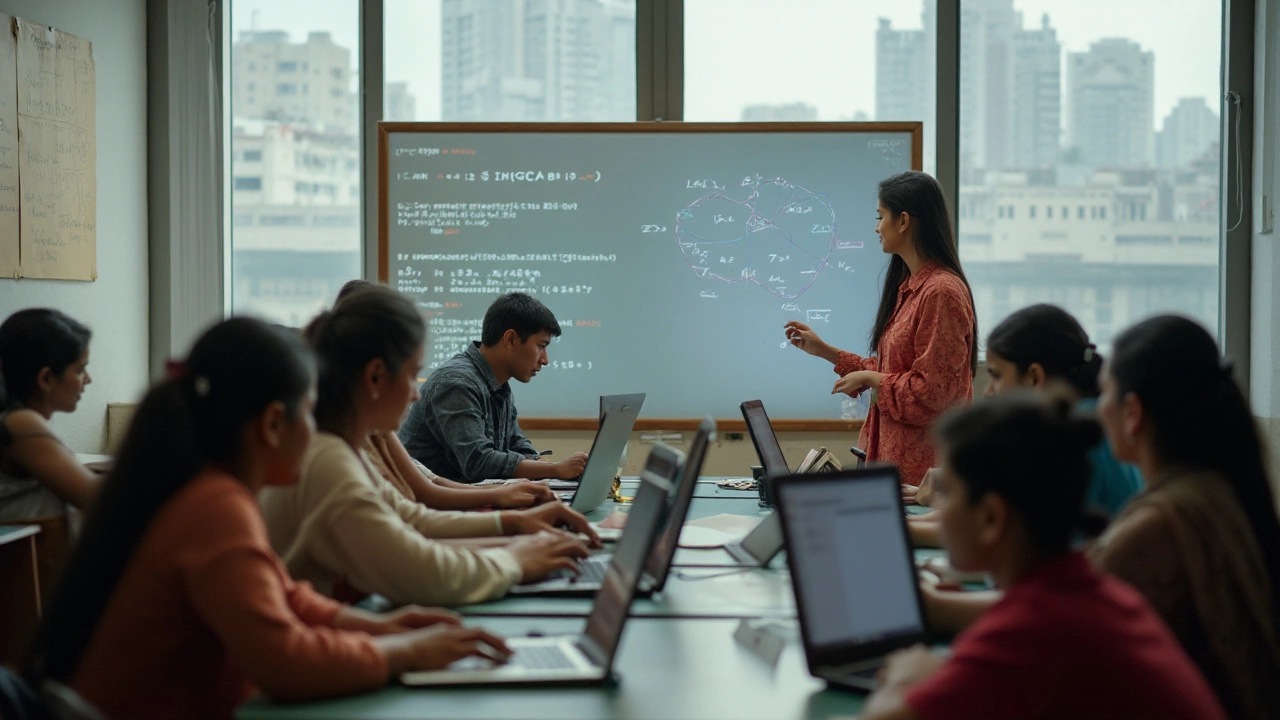In the world of programming, the question of math's necessity often stirs lively discussions. Many eager learners wonder if their lack of mathematical prowess will hinder their journey into coding. The link between math and coding isn't as daunting as some might assume, though. Understanding the blend of these two realms can open new doors for those looking to embrace technology.
While it's true that some math concepts can boost programming skills, let's untangle which specific areas might prove beneficial. The reality is, you don't need to be a math whiz to write good code. What's more important is developing a problem-solving mindset.
If terms like algorithms or variables make your heart race, fear not—those feelings are shared by many new coders. This article will explore common myths, offer reassurance, and provide guidance for budding programmers, revealing that the path to coding is accessible to all, regardless of their math background.
- Understanding Coding and Math
- Essential Math Concepts for Programmers
- Debunking Myths About Math in Coding
- Tips for Learning to Code with Minimal Math
Understanding Coding and Math
At first glance, coding and mathematics may seem like two sides of the same coin. Both involve logic and precision, and they often appeal to analytical brains. However, the relationship between coding and math isn't as straightforward as one might think. While there is overlap, it's crucial to dissect their roles individually. Coding is predominantly task-focused, requiring developers to instruct a computer in a way it can understand and execute. Mathematics, on the other hand, deals with quantities, patterns, and logical reasoning.
In the realm of programming, you encounter specific mathematical concepts that are integral to writing effective code. For instance, algorithms, a fundamental part of coding, stem from mathematical logic. Algorithms solve problems systematically, and understanding how they work can significantly improve one’s coding abilities. It’s akin to crafting a recipe for a computer, guiding it on tasks from sorting data to managing complex computations efficiently.
Paul Graham, a noted figure in the world of programming, once remarked, "Programming is not about typing, it's about thinking." This highlights the cognitive component rather than the mathematical one.
Despite common misconceptions, you don't need to hold a degree in mathematics to start learning to code. In web development, for example, HTML and CSS require no special mathematical skills. When it comes to application development, you can often bypass intricate calculations. What's essential is understanding logical sequences and how they relate within your code. Recognizing patterns, which is a skill honed in math, can streamline your approach to these coding challenges.
Incorporating mathematics into coding may still be necessary, particularly in fields like game development or data science, where calculus and probability often come into play. But even here, the coding community has empowered itself with libraries and frameworks that perform hefty calculations. These tools minimize the need for hands-on math-intensive coding, allowing programmers to focus more on creativity and logic rather than being bogged down by equations.

Essential Math Concepts for Programmers
When stepping into the dynamic world of programming, understanding certain key math concepts can significantly enhance your journey. Let's dive right in: the foundational building block here is problem-solving. Math, at its core, is about solving complex problems, just as coding involves breaking down larger tasks into manageable steps. You'll often encounter terms like variables and functions, which are mathematical ideas translated into computational language. For instance, algorithms—the backbone of efficient coding—are expressed mathematically but don't require you to solve endless equations.
One noteworthy area is logical thinking, which is indispensable in programming. Logic forms the basis of decision-making processes that underpin all programming activities. Understanding binary logic, involving operators like AND, OR, and NOT, can help you craft conditional statements that guide the function of your programs. Although you don’t need to be a mathematician, grasping these logical constructs is beneficial. As Donald Knuth, a renowned computer scientist, said,
"The study of algorithms should offer opportunities for doing mathematics."His insights emphasize that while math can complement programming, it doesn't dominate the field.
Another critical concept is algebra. While on the surface, algebra appears to be only about solving equations, in coding, it's about manipulating data. Algebraic thinking helps when you're dealing with formulae or patterns in data. Understanding how variables interact can not only improve your code efficiency but reduce errors, thus making your coding journey smoother. If you’re inclined towards game development or graphical computations, linear algebra can provide additional depth by dealing with vectors and matrices commonly used in 3D graphics and simulations.
Then there's statistics and probability, domains increasingly significant in today's data-driven world. With trends tilting towards data science and artificial intelligence, basic knowledge in statistics and probability can allow programmers to process datasets effectively. Having the ability to interpret results, calculate averages or deviations, and predict trends from data are all grounded in these math principles. Additionally, within AI and machine learning, understanding these concepts helps in algorithm training and performance predictions, critical in the creation of intelligent systems.
Finally, computational thinking developed from exploring these concepts provides cognitive skills that drive coding proficiency. As you gain confidence in these mathematical areas, an interesting insight emerges: the journey enhances logical precision and creativity, forming a solid foundation for effective programming skills. It's important to recognize that the process of learning these concepts is gradual, often unique to each person's coding adventure, and should not be rushed. Remember, these are tools to aid your journey into coding but aren't barriers.

Debunking Myths About Math in Coding
When venturing into the coding universe, many newcomers are met with the intimidating idea that mastering math is an absolute prerequisite. This myth has, for far too long, deterred many talented minds from exploring programming. However, the truth is less black and white. While certain advanced fields in computer science may involve complex mathematical theories, the bulk of coding tasks can be effectively tackled with high school level math or even less. Let's take a moment to sort fiction from fact and provide some peace of mind to aspiring coders.
Consider the role of math in various programming tasks. It's true that concepts like logic and algorithms include mathematical elements, but they can often be related to problem-solving more than number crunching. For instance, understanding variables in coding might initially seem math-heavy, but it's not about solving equations; it’s about managing data efficiently. As Kevin Kelly, co-founder of Wired Magazine, once said,
"You don’t need algebra; you need troubleshooting skills and pattern recognition."
One common myth is that becoming a successful coder means conquering calculus or mastering linear algebra. This couldn't be further from the truth for many popular areas of programming. Fields like web development, for example, rely more heavily on creativity and design skills than intensive math skills. A budding web developer might find HTML, CSS, and JavaScript easier to grasp with basic math proficiency. Only more niche domains such as graphics programming or certain areas of machine learning might lean more heavily on math.
For data science enthusiasts, on the other hand, the story can be slightly different. Since data science sits at the intersection of programming and statistics, an understanding of statistical methods can be incredibly helpful. Yet, even here, software libraries such as Python’s Pandas and NumPy simplify data processing, allowing coders to focus on data interpretation rather than raw calculations. Such tools bridge the gap for those hesitant about diving into deep math concepts.
Statistics can paint a broader picture. According to a survey among professional developers by Stack Overflow, only about 30% of professionals used advanced math regularly in their work. In essence, coding empowers you to focus on logical structuring rather than mathematical theory. Emerging areas like artificial intelligence do spark curiosity around math, but even here, pre-built libraries and frameworks minimize the need for developing mathematical expertise from scratch.
Fear of math should never overshadow your ambition to code. Embrace coding classes that emphasize practical skills and logical thinking. Adjust your learning path based on the specific area you're interested in. Whether you're building apps, designing websites, or venturing into AI, you’ll find the programming community welcoming and rewarding, driven not just by equations, but by your passion to solve problems creatively.

Tips for Learning to Code with Minimal Math
Getting started with coding doesn't have to be a daunting task for those who feel math isn't their strong suit. In fact, the path to becoming a proficient coder can be an incredibly creative and fulfilling journey, even if numbers aren't your best friends. Successful programming relies heavily on creativity, logic, and the ability to solve complex problems. To begin, it's essential to focus on the programming concepts themselves rather than getting bogged down by intricate math theories. Starting with high-level programming languages, such as Python, is often recommended for beginners. These languages are designed to be intuitive and closely resemble natural language, making them easier to grasp without needing an extensive math background.
One effective strategy is to engage with interactive coding platforms and online resources that prioritize hands-on learning. Websites like Codecademy and freeCodeCamp offer rich, beginner-friendly environments with carefully structured lessons that ease you into the world of coding. Building projects from day one and applying what you learn in real-world contexts reinforces understanding and develops problem-solving skills, which are often more critical in coding than algebraic equations. Another critical approach is to participate in coding communities, either online or offline. These communities can provide valuable support and resources such as code reviews, mentorship, and collaborative opportunities. Surrounding yourself with other learners and seasoned developers can provide guidance and inspiration in navigating your coding journey.
Moreover, it can be beneficial to develop computational thinking. This involves breaking down problems into more manageable parts, identifying patterns, and creating step-by-step solutions. These skills naturally develop over time as you engage with coding exercises and projects. It's important to remember that even experienced developers don't always rely on advanced math in their day-to-day work. In fact, many areas of software development, such as front-end development or UX design, require minimal math. A famous quote by Steve Jobs captures this well when he said,
“Everybody should learn to program a computer because it teaches you how to think.”Emphasizing logic and creativity, rather than strict numeric calculations, makes coding accessible to individuals from various disciplines.
When you encounter math-heavy content such as algorithms or data science, recognize that these are specific fields within the larger tech landscape. Beginner coders don't necessarily need to tackle these right away. Focusing on mastering coding fundamentals first can lay a solid foundation, upon which more complex skills, including math, can be built later if needed. Tracking progress through beginner projects like creating simple websites or automating daily tasks can boost confidence and keep motivation high when learning to code. Documenting your efforts by maintaining a learning journal or blogging about your coding experiences can add an additional layer of learning by reflection. This approach not only consolidates your understanding but also showcases your journey to potential employers or collaborators.
To sum up, while taking initial steps in coding may appear intimidating for those wary of math, focusing on fundamental programming concepts and investing time into practical, engaging projects can demystify the process. Gradually building confidence and skills without feeling overwhelmed by mathematical complexities allows creativity and logical reasoning to take the forefront. As you explore and grow, remember that coding offers an exciting realm of possibilities that is open to everyone eager to learn, regardless of their mathematical prowess.






Write a comment: